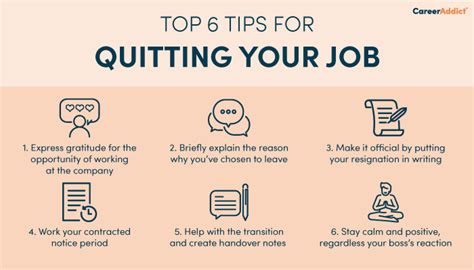Deciding to quit your job to pursue a master’s degree is a big decision. There are many factors to consider, such as your financial situation, career goals, and personal circumstances. Here are some things to think about before you make the leap:

Your Financial Situation
Pursuing a master’s degree can be expensive. According to the National Center for Education Statistics, the average cost of tuition and fees for a master’s degree in the United States is $30,000. In addition, you may need to factor in the cost of living in a new city, as well as the opportunity cost of leaving your job.
Consider your financial situation and make sure you are prepared for the costs of pursuing a master’s degree. You may need to save money, take out student loans, or find a graduate assistantship that provides financial support.
Your Career Goals
Think about how a master’s degree will help you achieve your career goals. Will it open up new opportunities for you? Will it make you more competitive in the job market? Will it lead to a higher salary?
Consider your long-term career goals and make sure that pursuing a master’s degree is the best way to achieve them.
Your Personal Circumstances
Consider your personal circumstances before you quit your job to pursue a master’s degree. Do you have family obligations? Do you have a stable financial situation? Are you prepared to relocate?
Make sure that you are in a position to pursue a master’s degree without putting undue stress on your personal life.
Benefits of Quitting Your Job for a Master’s Degree
There are several benefits to quitting your job to pursue a master’s degree, including:
- Career advancement: A master’s degree can open up new career opportunities for you. It can also make you more competitive in the job market and lead to a higher salary.
- Personal growth: Pursuing a master’s degree can help you develop new skills and knowledge. It can also help you become more intellectually curious and well-rounded.
- Increased earning potential: According to the U.S. Bureau of Labor Statistics, workers with a master’s degree earn, on average, $15,000 more per year than workers with only a bachelor’s degree.
Common Mistakes to Avoid
Here are some common mistakes to avoid when deciding whether to quit your job to pursue a master’s degree:
- Not doing your research: Make sure you understand the costs, benefits, and time commitment involved in getting a master’s degree before you make a decision.
- Not having a plan: Quitting your job without a plan can lead to financial hardship and stress. Make sure you have a solid plan in place for financing your education and finding a new job after graduation.
- Not considering your personal circumstances: Make sure you are in a position to pursue a master’s degree without putting undue stress on your personal life.
- Quitting your job without a backup plan: Always have a safety net, it could be a part-time job, freelance work, or remote positions. Anything that will bring you some cashflow.
6-8 FAQs
Here are some frequently asked questions about quitting your job to pursue a master’s degree:
- How much does it cost to get a master’s degree? According to the National Center for Education Statistics, the average cost of tuition and fees for a master’s degree in the United States is $30,000.
- How long does it take to get a master’s degree? Most master’s programs take two years to complete full-time. However, some programs may take longer, especially if you are working part-time or taking classes online.
- What are the benefits of getting a master’s degree? A master’s degree can open up new career opportunities for you, make you more competitive in the job market, and lead to a higher salary.
- What are the common mistakes to avoid when deciding whether to quit your job to pursue a master’s degree? Some common mistakes to avoid include not doing your research, not having a plan, not considering your personal circumstances, and quitting your job without a backup plan.
- How can I pay for a master’s degree? There are several ways to pay for a master’s degree, including saving money, taking out student loans, and finding a graduate assistantship that provides financial support.
- Should I quit my job to pursue a master’s degree? Ultimately, the decision of whether to quit your job to pursue a master’s degree is a personal one. Consider your financial situation, career goals, and personal circumstances before you make a decision.
